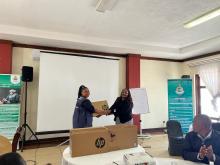Zimbabwe conducts health labour market analysis
By Vivian Mugarisi
Bulawayo, Zimbabwe – Zimbabwe’s National Health Strategy 2021-2025 aims at improving the health and wellbeing of the population and eventually ensuring universal health coverage. Achieving universal health coverage is dependent on sufficient, equitably distributed and well performing health workforce.
With an annual average population growth of 1.5% and high prevalence of communicable and non-communicable diseases, the health sector in Zimbabwe has struggled to keep pace with rising demand for healthcare services. In addition, the health system faces challenges in critical areas of human resources for health (HRH), with the COVID-19 pandemic exacerbating the situation. The challenges include quantity, size, absorption of health workers, geographic and health facility level distribution of health workers, skill mix and health workforce management capacity. Zimbabwe is one of the low-income countries in which the number of health workers is less than 23 per 10,000 people, a critical threshold below which essential health services are difficult to deliver.
The Government of Zimbabwe (GoZ) is conducting a comprehensive analysis of the country’s health labour market that started on 14 August 2022. The analysis seeks to interrogate factors that drive the country’s capacity to expand and retain its health workforce. The results will guide articulation of a national Human Resources for Health strategic plan. The strategic plan will be aligned with the Health Strategic Plan 2021-2025 and the National Development Strategy (NDS1) with the aim to ensure Universal Health Coverage for all Zimbabweans.
“The success of this health labour market analysis will provide evidence and insight on the Zimbabwe population health needs, the health workforce issues and dynamics, particularly in the health labour market of Zimbabwe,” noted Health Services Board (HSB) Acting Executive Director Mr Anglebert Mbengwa.
While Zimbabwe has traditionally performed above the African average of 46%, with a Universal Health Coverage index of 55% from 32% in 2000, the pace has however been stagnant since 2015. A closer look at the data shows that one of the weak links in the health service delivery is the inadequacy in the number of health workers, inappropriate skill mix, and inequitable distribution throughout the country.
Through HSB and the Ministry of Health and Child Care (MoHCC), the GoZ recently reviewed the National HRH policy, laying a clear policy direction toward having an adequate, well-trained and motivated health workforce for the attainment of the aspirations of the national health strategy, especially for UHC and SDGs. In addition to HSB and MoHCC, other ministries involved in the process include Ministry of Finance and Economic Development, Ministry of Higher and Tertiary Education and the Ministry of Public Service, Labour and Social Welfare. Other government agencies and partners include the Korea International Cooperation Agency, Nurses Council of Zimbabwe, Private Hospitals Association of Zimbabwe, UNDP, UNFPA, University of Zimbabwe, the Zimbabwe Health Apex Council and Zimbabwe National Statistics Agency (Zimstats).
Technical and financial support is coming from the Global Fund, Global Financing Facility (GFF), World Bank and WHO. The new HRH Strategy will be costed to produce HRH Investment Case which will produce an HRH Compact. This Compact will become a resource mobilization tool through which stakeholders can contribute in implementation of the new HRH Strategy.
“For Zimbabwe’s health systems to fully recover from the adverse impact of the pandemic and to adequately deliver on the promise of UHC, there is an urgent need for a renewed focus on the health workforce,” said Dr James Asamani, WHO Technical Officer, Human Resources, Health Systems and Universal Health Coverage.
He added; “Learning from the experience of other countries, it has the potential to unlock opportunities to mobilize resources domestically and through development partners to strengthen the health workforce and the health system to deliver for Zimbabweans the aspiration of UHC and the key targets of the National Health Strategy.”

